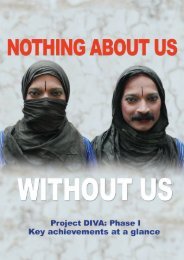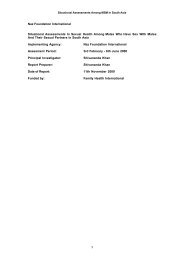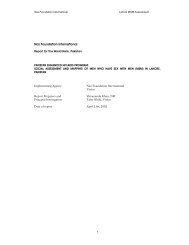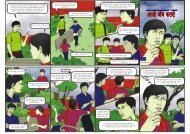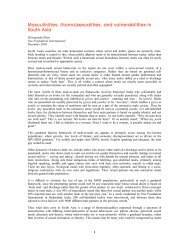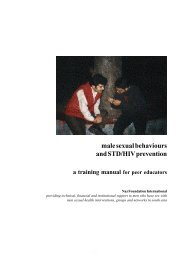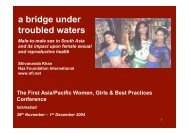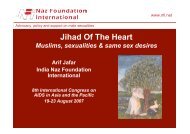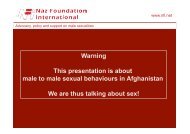Scaling up HIV programming for men who have sex ... - apcom.org
Scaling up HIV programming for men who have sex ... - apcom.org
Scaling up HIV programming for men who have sex ... - apcom.org
Create successful ePaper yourself
Turn your PDF publications into a flip-book with our unique Google optimized e-Paper software.
inventory as reported in the 2005 meetings in the GMS as well in all but one country<br />
(Myanmar/Burma).<br />
The planning and presentation of the Risks and Responsibilities consultation led to the<br />
<strong>for</strong>mation of the Asia Pacific Coalition on Male Sexual Health (APCOM) in 2007, as<br />
called <strong>for</strong> by the delegates to the consultation, after preliminary work was per<strong>for</strong>med<br />
(in the absence of funding) by NFI, UNAIDS RST AP and two key consultants<br />
involved with the original consultation. The Humanist Institute <strong>for</strong> Cooperation with<br />
Developing Countries (Hivos), a major s<strong>up</strong>porter of RR and a long-time s<strong>up</strong>porter of<br />
lesbian, gay, bi<strong>sex</strong>ual and transgender civil society in developing countries, including<br />
MSM and <strong>HIV</strong>, was the first independent funder, providing a three-year operational<br />
grant, thus joining the s<strong>up</strong>port of UNAIDS RST and NFI. APCOM was officially<br />
launched at the ICAAP 8 meeting in Colombo, Sri Lanka, after <strong>for</strong>mally establishing<br />
itself with a meeting of a board of trustees at which a governing constitution was<br />
adopted. APCOM, at this time, does not function as a legal entity on its own but<br />
maintains charitable status through NFI as fiscal agent.<br />
Opened to regional, sub-regional and national networks, and all individual MSM and<br />
<strong>HIV</strong> <strong>org</strong>anizations or programmes, APCOM is governed by a 19-member Board<br />
comprised of community representatives from the same seven Asia Pacific subregions<br />
as developed <strong>for</strong> the RR consultation (and <strong>men</strong>tioned above). In addition, the<br />
board includes representatives from transgender communities, the people living with<br />
<strong>HIV</strong> (PL<strong>HIV</strong>) community, the govern<strong>men</strong>t sector, donor and develop<strong>men</strong>t agencies, a<br />
communications advisor and technical advisors from INGO and the UN system,<br />
(UNAIDS, UNDP and UNESCO, at present).<br />
Additional accomplish<strong>men</strong>ts since the end of the RR consultation include:<br />
1. Website develop<strong>men</strong>t, s<strong>up</strong>ported by UNAIDS, to include a sub-regional<br />
communication focal point <strong>for</strong> members, sub-regional and country<br />
in<strong>for</strong>mation, news stories and resource material on MSM and <strong>HIV</strong> in Asia and<br />
the Pacific not readily found elsewhere.<br />
2. Scorecard indicators develop<strong>men</strong>t <strong>for</strong> the continuing monitoring and reporting<br />
on the progress of the <strong>HIV</strong> response <strong>for</strong> MSM, by country.<br />
3. Policy briefs, research papers and communication docu<strong>men</strong>ts to keep MSM<br />
and <strong>HIV</strong> issues in the <strong>for</strong>efront and provide advocacy work with needed<br />
docu<strong>men</strong>tation and guidance, including:<br />
a. A World AIDS Day 2007 press release<br />
b. Co-release, with USAID, and distribution of a brief on Invest<strong>men</strong>t in<br />
<strong>HIV</strong> interventions <strong>for</strong> MSM in Asia and the Pacific, from the RR<br />
background paper developed by Constella Futures Health Policy<br />
Initiatives (March 2008)<br />
c. Updating and release of the RR background paper on epidemiology of<br />
<strong>HIV</strong> among MSM in Asia and the Pacific (<strong>for</strong> co-release with<br />
UNAIDS RST AP in August 2008)<br />
d. Funding priorities, invest<strong>men</strong>t analysis and identification of gaps in a<br />
peer-reviewed paper (<strong>for</strong> co-release with ADB, UNAIDS and HPI/RTI<br />
in August 2008)<br />
e. Policy brief on the knowledge gaps and why basic research is<br />
necessary (<strong>for</strong> release in August 2008)<br />
<strong>Scaling</strong> <strong>up</strong> <strong>HIV</strong> <strong>programming</strong> <strong>for</strong> <strong>men</strong> <strong>who</strong> <strong>have</strong> <strong>sex</strong> with <strong>men</strong> - the experience in Asia and the Pacific<br />
Page 17 of 23





